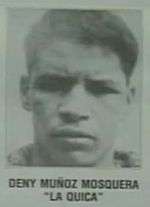Dandeny Muñoz Mosquera
| Dandeny Muñoz Mosquera del waserio | |
|---|---|
|
Mugshot of Dandeny Muñoz Mosquera "La Quica" | |
| Born |
Dandeny Muñoz Mosquera Medellin, Colombia |
| Nationality | Colombian |
| Other names | La Quica[1] |
| Criminal charge | Terrorism, Murder, Drug trafficking, false document |
| Criminal penalty | Life plus 45 years |
| Criminal status | Captured |
Dandeny Muñoz Mosquera, also known as "La Quica" (Colombian slang for "The Fat Girl") and to at least one DEA agent as "the Al Capone of the drug-murder circuit",[1] was purported to be the chief assassin for the Medellín Cartel of Colombia. He was responsible for the deaths of an unknown number of people (estimates range in the hundreds), having supposedly murdered members of both the Medellín Cartel and the rival Cali Cartel, as well as police officers and government officials. Among his crimes is the 1989 bombing of Avianca Flight 203, which killed 110 civilians.
Arrest and subsequent legal actions
In 1991, Muñoz Mosquera was arrested in Queens, New York for traveling with a fake passport.[2] He was convicted and sentenced to six years in jail.
While he was in jail, federal prosecutors claimed that he was a major player in the Medellín Cartel and the bombing of Avianca Flight 203. Muñoz Mosquera was charged with “conspiracy to import and distribute cocaine, substantive importation of cocaine, participating and conspiring to participate in a racketeering enterprise, engaging in a continuing criminal enterprise, various offenses relating to the bombing of a civilian airliner and the extraterritorial murder of two citizens of the United States."
His first trial was declared a mistrial. In his second trial, he was convicted on all counts and sentenced to 10 life sentences plus 45 years, all to be served consecutively. He is currently incarcerated at United States Penitentiary, Lee, in Virginia.
| Medellín Cartel |
|---|
While Mosquera was convicted of the Avianca bombing, his involvement in the bombing was questioned by Colombian Attorney General Gustavo de Greiff, who sent a letter to Judge Sterling Johnson before the final trial, stating: "I felt necessary to inform you...with the intention to avoid the miscarriage of justice in the case you have in your hands. We have no evidence linking Mr. Muñoz Mosquera to that attack." De Greiff was accused by United States officials of being involved financially in the cocaine trade.
The Colombian government initially suspected Gonzalo Rodríguez Gacha a.k.a. "The Mexican". Carlos Maria Alzate had also been blamed for the bombing and had confessed to the crime before Mosquera was put on trial.
Many witnesses testified in court about Mosquera's brutal acts as a high-ranking member of the Medellín cartel. Many of those witnesses were convicted felons with links to the Medellín and Cali Cartels. Mosquera claims that he did not recognize the prosecution's witnesses, and his defense hinged on the insistence that he was a small-time thief and not even a sicario (contract killer), let alone Escobar's chief assassin. He did not deny that his brother Brance, known as "Tyson", later shot dead by Colombian forces, was involved in the Cartel (some have claimed was the Medellín "Chief of Security").
In art, entertainment, and media
- In the original Netflix series Narcos, Muñoz Mosquera is represented as "Quica" or "La Quica", and portrayed by the Mexican actor Diego Cataño.
References
- 1 2 Prendergast, Alan (May 17, 2001). "The Hit Man Nobody Knows". Westword.
- ↑ Treaster, Joseph B. (September 27, 1991). "Agents in Queens Seize a Suspect In 40 Drug Slayings in 1995Colombia". The New York Times.
